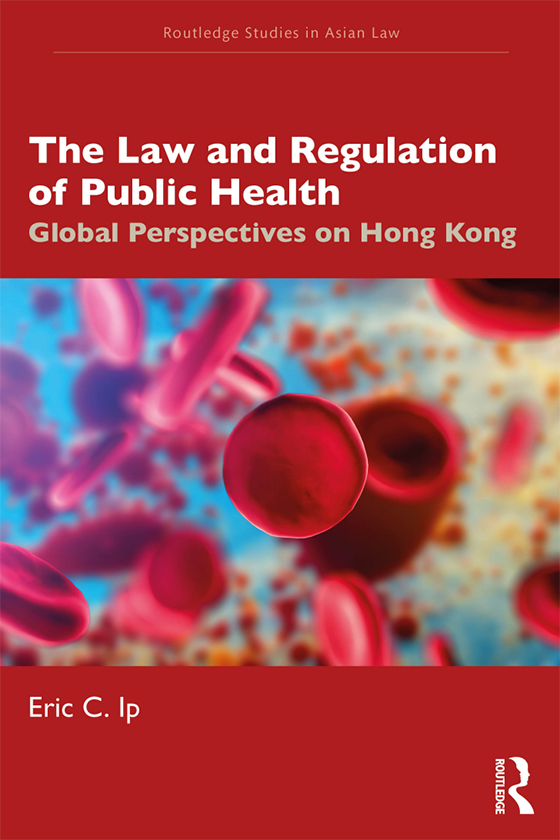November 2024 | Volume 26 No. 1
Tipping the Scales for Public Health
Listen to this article:
In the early months of the COVID-19 pandemic, the UK government announced that it was “following the science” in implementing severe interventions. The approach sounded reasonable, but soon revealed serious limitations, particularly in regard to people’s freedoms and mental health. Similarly, in Hong Kong, stringent interventions, such as mandatory masking and quarantine, were initially appropriate, but over time, with vaccinations and community immunity, they seemed unduly restrictive.
Professor of Law and public health bioethicist Eric Ip Chi-yeung, who is Co-Director of the Centre for Medical Ethics and Law, argues that policymakers tend to forget that the rule of law is as important to public health as science, in his new book The Law and Regulation of Public Health: Global Perspectives on Hong Kong.
“My book has two general messages. The first is that all the incredible achievements in public health during the 20th century were made possible by law, whether it be criminal law to punish those who do not wear seatbelts or administrative law to empower certain public authorities to enforce sanitation policies, administer immunisation programmes, and so forth,” he said.
“The second message is that while we need the guidance of scientists in making public health decisions, to rely exclusively on them would be woefully inadequate. Science can’t answer the crucial questions that governments face such as the trade-offs in the social relationships between the individual, the population and the state. During a lockdown, an appropriate balance must be struck between respiratory health and other dimensions of human flourishing, such as familial love, friendship, mental well-being, and economic stability.”
The Hong Kong case
His book outlines why and how the rule of law should be given its due place in protecting mental and physical health. Professor Ip chose Hong Kong as a case study because of the city’s remarkable legal history and effectiveness in achieving one of the highest life expectancies in the world.
Hong Kong’s first public health laws were introduced alongside those in Britain in the 19th century and expanded from infection control to communicable diseases starting in the 1930s. Infection control became the focus again after the SARS outbreak in 2003, which led to the adoption of the Prevention and Control of Disease Ordinance in 2008. This was put to full use during COVID-19 to mandate hotel quarantines, ambush lockdowns and the Vaccine Pass system.
“When society is largely healthy, we don’t notice public health law. But when something huge arises, such as a pandemic, suddenly we realise that it governs almost every aspect of our lives, including how many people we can meet in our own households, as the High Court puts it in an important ruling,” he said.
The book covers communicable and non-communicable diseases and other health issues, too, such as environmental health, occupational health, and tobacco control, and offers a systematic framework for evaluating public health law in any jurisdiction. Investigators need to understand the conceptual and historical foundations of local public health law and infrastructure, the freedoms and constraints on the state in containing infectious and non-communicable diseases, and the legal factors that affect public health.
Guiding principles
From there, Professor Ip expounds a list of principles to guide the development and application of public health law. For instance, when science and public health law conflict on public health interventions, the rule of law should claim supremacy. And when public health interventions designed to safeguard the right to health conflict with fundamental rights, there must not be a presumption that the intervention must prevail. “A very sick person can and should still enjoy the basic human good of friendship and familial love. We shouldn’t let any single right trump everything else,” he said.
Public health law should be recognised to be as much a constituent of the common good as population health. Interventions should be proportionate. Stringent conditions should be fulfilled before declaring a public health emergency and these should be reviewed. There should be checks and balances on public health powers.
Overly paternalistic public health measures that contravene constitutional rights and freedoms should be avoided – such as hypothetically banning sales of alcohol to people born after a certain year. The state has an obligation to support the right to life and health by maintaining social conditions conducive to these – for instance, by not isolating or creating difficult living conditions for the elderly, mentally unwell and other vulnerable populations during a health emergency.
Professor Ip acknowledged that public health emergencies require a rapid response. But in Hong Kong, “public health interventions should be regularly reviewed, not just by the executive but also by the legislature and even the judiciary, because they may no longer be relevant nor fulfil the requirements of the law when it comes to emergencies.”

The Law and Regulation of Public Health: Global Perspectives on Hong Kong
Author: Eric C Ip
Publisher: Routledge
Year of Publication: 2023
When society is largely healthy, we don’t notice public health law. But when something huge arises, such as a pandemic, suddenly we realise that it governs almost every aspect of our lives…

Professor Eric Ip Chi-yeung

